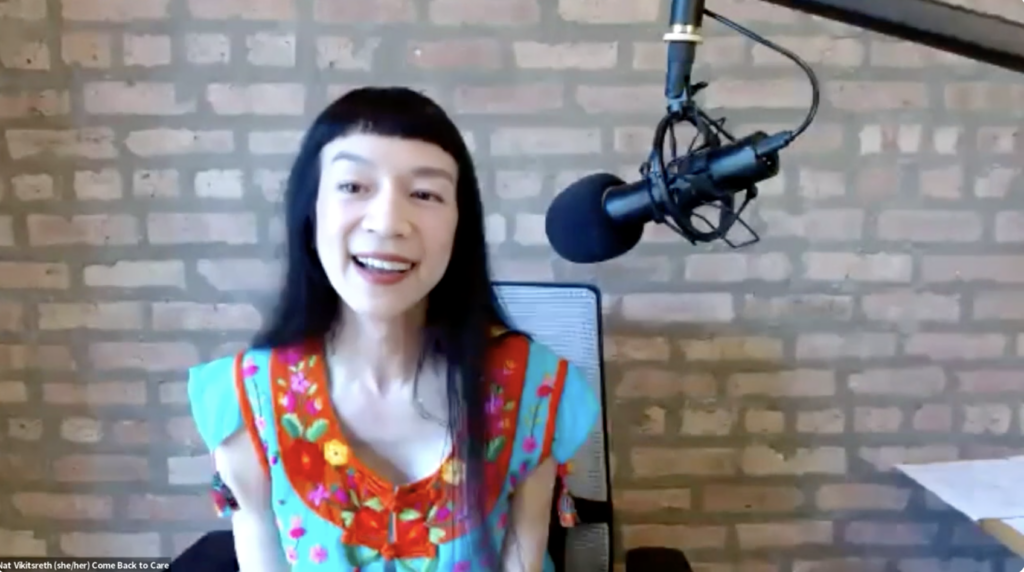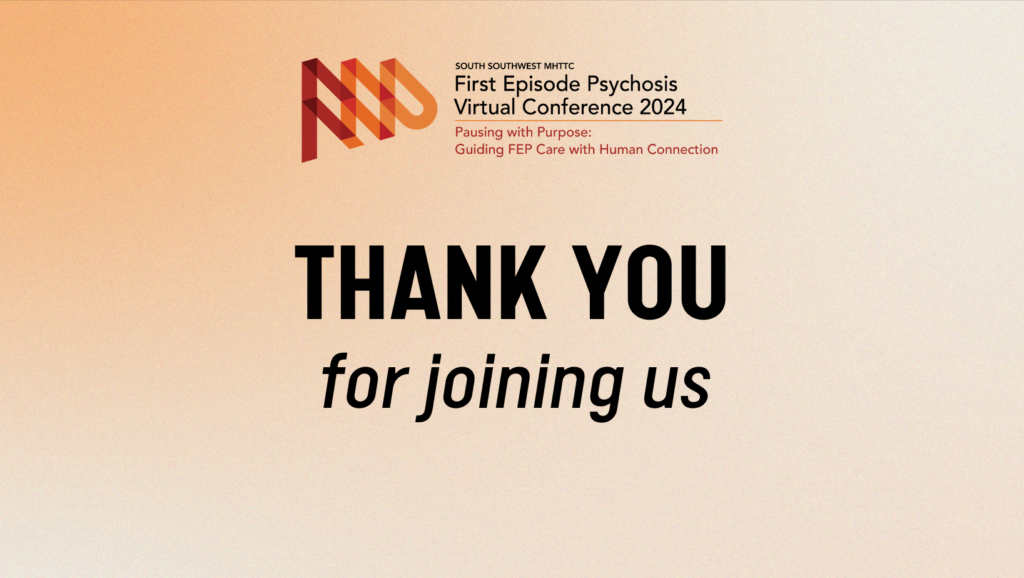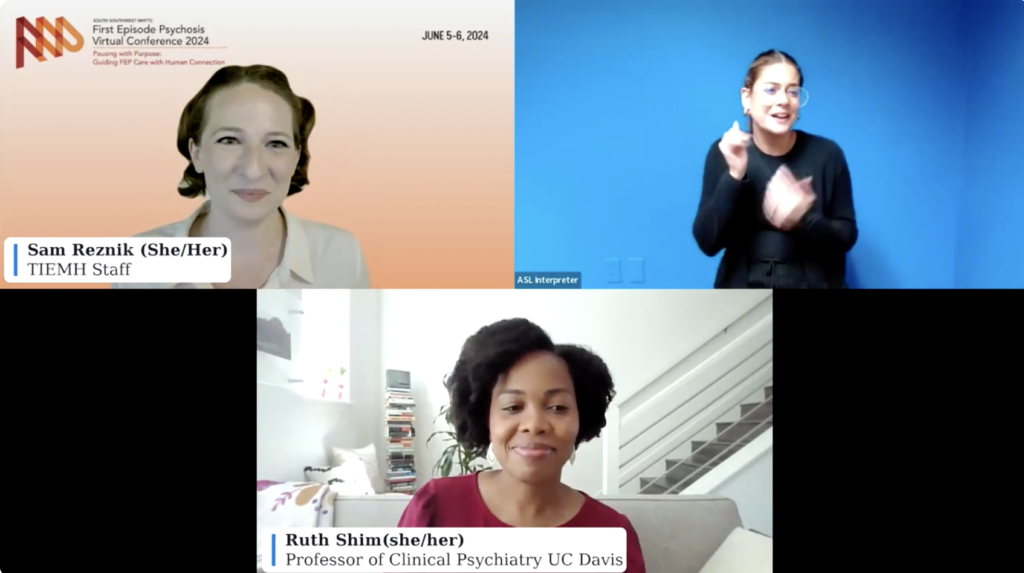Have you ever talked to someone about something that weighed heavy on your mind, and immediately felt lighter afterward?
In that moment, you felt seen and reassured. Maybe you didn’t get a solution to your problem, but that person helped you feel better by simply being in that space with you. This “quality of being with” is the essence of reflective supervision according to Nat Vikitsreth, LCSW, DT, CEIM.
Nat recently facilitated a webinar titled “The heART of Reflective Supervision: Attunement, Reflection, and Togetherness” with the South Southwest Mental Health Technology Transfer Center Network (MHTTC) and the Texas Institute for Excellence in Mental Health.
In this post, we’ll cover key insights from the session to help early childhood providers, specifically newcomers or those with up to three years of experience, understand the impact of reflective supervision.
According to the Health Federation of Philadelphia, reflective supervision is the regular collaborative reflection between a service provider and supervisor that builds on the supervisee’s use of their thoughts, feelings, and values within a service encounter. Reflective supervision complements the goals and practices of trauma-informed systems.
In reflective supervision, the relationship between supervisor and supervisee models the desired relationships between provider and client in a therapeutic/helping relationship. This relationship is based on collaboration, choice, trust, and control.

Nat Vikitsreth (she/her) works as a nationally award-winning decolonized therapist and facilitator, a trans rights activist, and host of the Come Back to Care Podcast. She founded Come Back to Care, an organization that focuses on anti-racist, conscious, and holistic parenting for anyone who loves and raises children.
Nat explains reflective supervision as the “quality of being with” where we witness and delight in someone's discovery of their groove, gifts, and growth.
Here’s an example:
Let’s say your home visitor got flustered in a session. They witnessed a toddler trying to play with their father, but instead of connecting with the child, he handed them an iPad to watch cartoons. The home visitor asked the father why he didn’t spend more time connecting with his toddler, which caused him to go quiet and shut down.
So, you ask questions like “What shaped your frustration there?” to explore their response without judgment. They explain that they’ve learned a lot about social-emotional development and the importance of being play-based and not relying on devices. In this situation, there’s tension between your home visitor’s beliefs and the father’s actions.
To help the home visitor empathize with the dad, you ask: “What do you think shaped dad’s decision to give the toddler an iPad?” By asking more questions and staying in this pattern of curiosity, you discover that your home visitor has had other moments in the past where they got triggered and entered a “teaching mode.”
You work through this together and ask them to think of moments where they got triggered but didn’t enter that reactive mode. Can they practice that regulation in moments with the father? You’re helping the home visitor understand how to apply their existing strengths to those moments with families. They already have what it takes to tackle this area of growth.
How many of you have been made to feel erased, silent, or small because of things like your skin color, immigration status, race, or gender? To some degree, we all carry this would of being erased. Here are a few actions Nat recommends to support your supervisee and help them feel seen.
Nat asks everyone to shift away from their fear of saying the wrong thing. Instead, communicate to the person in front of you that, “I have the capacity to hold hurt and harm when they occur.” You’re letting them know that they can trust you enough to share nuances of their processing and their stories.
You’re creating a contract together and building a container where they can talk about their race, gender, and other aspects of their identity. Since you have more power in this relationship as the supervisor, you have the responsibility to set that container and be proactive about it.
If your supervisee shares something during a session that makes you want to teach or correct them, take a step back first. There’s a time and place for that guidance, but for now, try to stay anchored in your curiosity so you can meet your supervisee where they’re at before teaching.
Contextualize their behaviors in a political, historical, and cultural-social context. Nat shares an important phrase from one of her teachers: “What’s hysterical is historical.” This suggests that a person's reaction or feelings may be triggered by something from their past.
The South Southwest MHTTC and the Texas Institute for Excellence in Mental Health provide a wide range of trainings, research, and other resources for providers.
Check out the process and resources catalog, and subscribe to our newsletter to hear about new materials!

Over 1000 unique attendees virtually joined the 2024 South Southwest Mental Health Technology Transfer Center Network (MHTTC) First Episode Psychosis (FEP) Conference from June 5-6. Individuals with lived experience, family members, providers, and researchers gathered to celebrate achievements and explore a future of sustained growth and accountability in FEP care.
This year’s theme was Pausing with Purpose: Guiding FEP Care with Human Connection, which focused on the crucial role of human connection in establishing effective FEP care.
The conference highlighted the importance of fostering genuine relationships within the FEP care community— including team members, young people in services, family and other supporters, and even the connection with yourself. Our team emphasized understanding oppression and advancements around diverse perspectives, with special attention to race, ethnicity, class, urbanicity, and language.
Since starting in 2020, this conference has grown tremendously with the help of our teams at the Texas Institute of Excellence in Mental Health (TIEMH) and South Southwest MHTTC. We asked organizers Jennifer Baran-Prall, LCSW and Samantha Reznik, PhD to share their thoughts about this year’s experience.
Jennifer: I loved the entire thing! As a conference planner, I truly enjoyed working with my team to make the experience happen. We have such great people dedicated to ensuring excellence in all that we do for others.
I also felt very honored to work with all of our speakers. Each person who presented was extraordinary. It was a privilege to collaborate with them and then to experience their actual presentation during the event.
I would also say that I felt a real sense of connection with everyone who attended the conference. Even though it was a virtual setting, I could feel the engagement, strength, interest, and compassion from our audience. That’s a very special feeling to experience such closeness of community within an event.
Sam: I also loved the entire conference. My favorite part was seeing how all the individual elements came together to create something greater than the sum of its parts.
Each speaker delivered an outstanding presentation, but it was the collective impact of these presentations that highlighted the vital importance of compassion and connection with ourselves, our relationships, and our broader communities.
This integration of ideas perfectly mirrored the conference theme— it’s not about us as individuals but about what we can achieve together when we focus on our relationships and communities. I was inspired by how many attendees shared this vision, which makes me hopeful for a future where mental health services are more humanistic and interconnected.

Jennifer: I always learn something new when I hear people share their lived experiences, and our speakers’ stories made an impact on my life.
“Seek first to understand then to be understood” resonated with me as I was reminded of how essential it is to actively listen and be fully present with others. I was also surprised by how often I need to remind myself to practice self-compassion. This is foundational for us all and I appreciated Dr. Neff’s presentation on centering this mindset.
Sam: I learned so many things from collaborating with community partners and leaders in Texas community mental health, Sharhonda Webster and Linda C. Williams, to develop the leadership panel. They challenged me to think deeply about how to be an authentic, transparent, and relationship-driven leader.
Their local leadership has been a source of inspiration for me, and seeing their influence resonate with a larger audience was incredibly impactful. Linda’s team motto: “I am, because we are” captures the spirit of the conference and the approach I aspire to bring to my work.
Jennifer: Thank you first and foremost for making the time to attend. Schedules are busy, and I’m so happy you could be present. I recognize that those who attended participated for a good reason.
You are out there doing outstanding work to help support people. Your work makes a difference in people’s lives. I hope that the information from this conference helps you in your efforts to support, mentor, and lead.
I also want to encourage you to practice self-compassion. This is essential to our well-being and will help us connect authentically with others. Please be sure to take advantage of the recordings and materials from the conference. We hope that you’re able to share this information with others, too!
Sam: I was moved by the attendee who asked about future conferences that focus on systems-level change. Both reflection and action are needed for transformation of our mental health systems. The insights shared at this conference were profound and essential.
In particular, we need to prioritize lived experience and marginalized voices as we change our systems. I’m excited for how each of us can apply these reflections in our work and our daily lives to effect real change. I hope that every conference attendee feels inspired to turn reflection into action, advancing recovery-oriented mental health systems.
At the end of the conference attendees were asked, “What about the event was most useful to you?” Below you’ll find a few of our favorite responses.
“So. Many. Things! This was probably the most helpful and impactful conference I have attended. Genuinely, so well cultivated. Much consideration was put into each person involved and it shows. I have admired Sam and Jennifer as a kind of mentor/teacher since I met them in provider calls as a new clinician in WV, carried through today for their ability to listen, encourage, honor, give thoughtful care and consideration for others, and their gifts to build people up so well.”
—
“The presentations were of excellent quality. They were informative, directly relevant to clinical work, and hugely helpful from a provider support standpoint.”
—
“I greatly appreciated the opportunity to hear about the lived experiences of people who have experienced psychosis. I also appreciate learning about alternatives/complements to medication.”
—
“I was so grateful for the Trauma and Psychosis presentation and reflections on Indigenous psychology. I find Indigenous psychology to be the most compatible in my mind between psychiatry and human experience. Overall, I have learned a lot and feel confident in my therapy approaches. I also appreciated the practical concepts learned in the opening session regarding compassion and the types of compassion.”
—
“I am new to mental health services. The topics gave me a great understanding of the issues at hand with services, strides made and filled me with hope, as speakers spoke frankly of changes that need to be made and the respect, dignity and grace that has been missing on both the patient and advocating side.”
Our website has resources for staying up-to-date on FEP care, including video recordings and slide decks from the conference presentations.
Also, during the conference attendees shared resources on a Padlet. Visit the board to check out insightful ideas, exercises, books, team-building activities, and more.